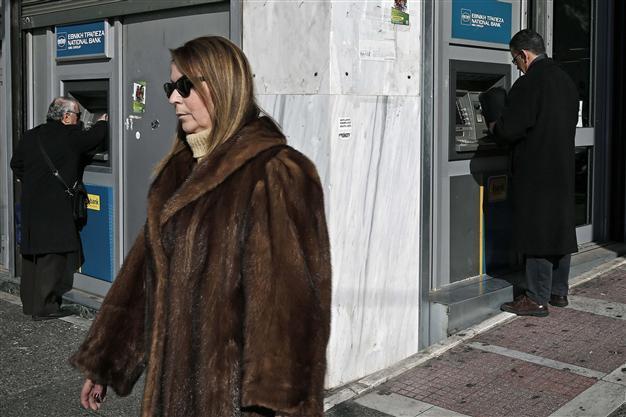Germany rejects Greece debt proposal
ATHENS - Agence France-Presse

People make transactions at ATMs outside a National Bank of Greece branch in Athens, February 19, 2015. REUTERS Photo
Germany rejected a request by Athens Thursday for a six-month extension to its EU loan programme, hitting hopes that Europe and Greece can find a solution to a bitter debt row.Eurogroup head Jeroen Dijsselbloem said finance ministers from the 19-member eurozone would meet in Brussels Friday to consider a make-or-break request by Athens to extend its European loan programme that expires at the end of the month.
But key powerhouse Germany quickly shot it down, slamming the Greek request as "not a substantial proposal for a solution" only moments after the European Union had hailed it as a step in the right direction.
The meeting on Friday will be the third attempt by the single currency bloc's ministers to reach a compromise with the new radical leftist government in Greece after previous talks ended in acrimony.
Greece made a formal request for a loan extension from eurozone finance ministers Thursday, which leaked reports said contained at least some concessions by Athens.
Greece said the request would satisfy the demands of its European partners, while also keeping a promise to end the hated austerity conditions in the bailout which it says has destroyed the economy and punished the poor.
"The government... is not asking for an extension to the memorandum," an official source in Athens said, referring to the reform agreement between Greece and its EU and International Monetary Fund creditors.
Wording is key to resolve the feud, with Greece's ruling Syriza party saying that it is only requesting an extension to the loan part of the 240 billion euro rescue that came with commitments to push through austerity and deep reforms.
But key eurozone partners, led by powerhouse Germany, say the distinction is unacceptable, insisting that any extension include the austerity commitments of the full programme.
In confirming the request by Greece, Dijsselbloem carefully avoided the wording row, leaving Friday's meeting hanging on whether both sides can agree on the language.
"Received Greek request for six months extension," Dijsselbloem, who is also the Dutch finance minister, said in a tweet.
A spokesman for German Finance Minister Wolfgang Schaeuble said the Greek letter "does not meet the criteria" laid out by eurozone ministers.
In substance, the two sides are not that far apart, with new Greek Prime Minister Alexis Tsipras willing to press on with reforms, if different from those embraced by previous conservative governments.
In return, Tsipras is demanding that the eurozone agree to short-term funding to buy the time needed to hammer out a new rescue deal, something the requested extension would provide.
But Germany rejects offering Greece more time outside the current arrangement, especially regarding the austerity commitments.
Schaeuble has accused Athens of wanting something for nothing and has urged Tsipras to "tell the Greeks the truth: there is no fast way out."
Greece has proposed to stick to 70 percent of the existing bailout programme but would overhaul the remaining 30 percent which it sees as damaging to growth and toxic for ordinary Greeks.
Greek Finance Minister Yanis Varoufakis insisted Greece and the eurozone were "on the right path".
"I am optimistic it will end well tomorrow or the next day," Varoufakis told reporters on Wednesday.
The European Commission, the EU's executive arm, also seemed optimistic, believing that the Greek request could "pave the way" for a difficult compromise, a spokesman said.
With the European portion of the bailout expiring at the end of February, Greece's creditors insist it needs extra financing to stave off the risk of a default and exit from the euro.
Providing much needed breathing room to Athens, the European Central Bank decided Wednesday to extend and increase the amount of emergency liquidity available to Greece's vulnerable banks.
The decision to raise the ceiling of that funding by only 3.3 billion euros, however, was seen by analysts as a warning by the ECB, pushing Athens to clinch a deal with its eurozone partners as soon as possible.
As the clock ticked down to a Friday deadline set by Dijsselbloem, US Treasury Secretary Jacob Lew called Varoufakis to urge him to work on a deal based on the existing bailout agreement.
He told him "failure to reach an agreement would lead to immediate hardship in Greece, that the uncertainty is not good for Europe, and that time is of the essence," the Treasury said Thursday.
















